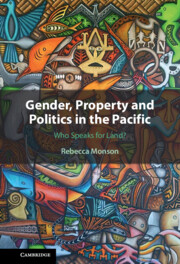‘This incredibly valuable work provides a rich analysis of the multiple contestations that emerge around land tenure in the encounter of Pacific communities with aid and development processes. Rebecca Monson brings her own fieldwork into conversation with an extraordinary range of theoretical literatures in producing an analysis that is compelling, enlightening, and highly readable.’
Margaret Davies - Flinders University
‘This highly sophisticated analysis demonstrates how legal imperialism of colonial administrators together with missionaries of a wide range of Christian sects, has consistently marginalized women’s access to land. It is a superb study of how the entanglement of language, ethnicity, and religion underscores vicious antagonism in struggles for resources.’
Keebet von Benda-Beckmann - Max Planck Institute for Social Anthropology
‘The naturalization of inequality is ubiquitous. Yet, this book shows how people can locate an emancipatory potential if they refuse the narrow confinement of ‘justice’ offered to them by the State. Monson’s careful ethnography is a welcome reminder of the power of keeping eyes open.’
Christian Lund - University of Copenhagen
‘This book provides a compelling and important account of the legacies of colonialism and its entanglements in Oceania. Monson draws on Indigenous research methodologies and her collaborations with communities, local NGOs and Indigenous scholars to provide a vital new approach to understanding the intersection of law, gender, land and political authority.’
Joseph Foukona - Professor of South Pacific, Melanesia, Pacific Legal Systems and History, University of Hawaiʻi at Mānoa Department of History
‘… Monson’s book contributes to the body of feminist political ecology … [her] highly original interdisciplinary sociolegal research is characterized by impressive scholarly rigor and a policy relevance far beyond her regional focus on the Pacific.’
Rachel Sieder
Source: Legal Pluralism and Critical Social Analysis



